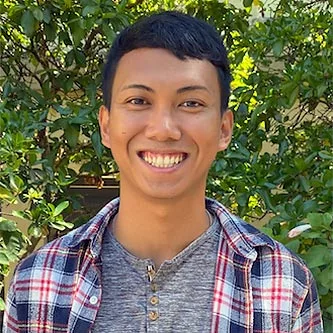Master of Arts (MA) in Communicology
The Communicology MA program focuses on the dynamics of human interaction: how people understand, relate, and influence each other. Located in Honolulu, Hawaiʻi, at a “crossroads” between the East and West, the program emphasizes the role of different cultural perspectives and social identities in communication and how people can create understanding and communicate effectively.
Learn more about the Communicology program.

How has the Communicology/Speech program changed the way you think?
The Communicology MA program pushed me to see different perspectives regarding how communicative behaviors can be interpreted. This helped me figure out more effective ways to teach course content to students and achieve more understanding with others. I have become a better teacher and a more confident communicator.
Mark Jehnsen Bumanglag
Master of Arts (MA) in Communicology
Additional Details
The application deadline is January 15 (for priority consideration). After January 15, applications are accepted and considered on a rolling basis.
Students in our MA program usually have a strong undergraduate background in Communicology, Communication, Psychology, or a related discipline.
The application process has three steps:
Step 1: Complete a Graduate Division Application
To apply to the Communicology MA program, students must first apply to the University of Hawaiʻi at Mānoa. To do so, follow the instructions provided by the UHM Graduate Division.
Step 2: Solicit Three Academic and/or Professional References
Applicants should then seek three academic and/or professional references who can complete the Communicology Program – Recommendation Form. References should be able to comment on the applicant’s:
- Preparation and potential for success in graduate school;
- Teaching potential, for applicants who wish to be considered for a GTA position.
Applicants should ensure that ample time is provided to their references to submit their recommendations by the deadline.
Step 3: Complete a Communicology Supplemental Application
Applicants must then complete the Communicology Supplemental Application form. (Note: Submission of this form will automatically notify the references listed). After submitting all their materials, applicants may be asked to participate in either an in-person or remote (online) interview as part of the application process.
For questions/concerns regarding Steps 2 and 3 of the application, please contact the Communicology Graduate Chair (comgrad@hawaii.edu).
The Master of Arts (MA) in Communicology requires the completion of 33 credit hours.
Required Coursework
- At least 27 must be completed in Communicology courses numbered 601 and above.
- All students are required to take and successfully complete:
- COMG 601: Theories of Communicology
- COMG 602: Research Methods in Communicology
- Students who wish to complete the Plan A (thesis) option are also required to take and successfully complete:
- COMG 612: Advanced Research Methods in Communicology
Additional Notes
- The COMG MA is typically a two-year program for students who enroll full-time. Students may also enroll part-time.
- Courses from allied disciplines may be counted toward the Communicology MA. On rare occasions, an upper-division undergraduate Communicology course may be used toward the Communicology MA. However, prior written approval of the Communicology Graduate Chair and the candidate’s faculty advisor must be obtained before either enrolling in a graduate course outside of Communicology or enrolling in an upper-division Communicology course taken for graduate course credit.
Two tracks are available for completing the MA, and students must choose either Plan A or Plan B by the end of their second semester of study.
Plan A (thesis)
This option involves the completion of an original empirical research project overseen by a level 2 or level 3 graduate faculty member. Thesis projects are intended to be scholarly work in the field of communication. A thesis must be initially proposed and later defended to an advisory committee comprised of graduate faculty members (an advisor and two other graduate faculty members). Thesis candidates must present an acceptable written thesis and pass a final oral examination of the thesis.
Plan B (non-thesis: applied project)
This option requires candidates to complete a non-thesis applied project that addresses a communication-related issue in an applied or real-world setting (e.g., for an organization or group; for a specific public audience). The project can take a variety of forms, but it must incorporate research from scholarly journal articles and other academic sources to inform their choices in developing the project and answering the focal questions in that project.
The scope of the Plan B project is flexible. It can be a year-long project consisting of a single, substantive undertaking (e.g., designing and implementing a training program). The project can also be a smaller project that answers a series of targeted questions about communication-related issues in a specific applied setting (e.g., analyzing existing data on a situation and providing corresponding recommendations). If students choose a smaller project, they must take an additional 600+ level content course to satisfy the credit requirements for the degree.
Upon completion of the Master of Arts (MA) in Communicology, students should be able to:
- Demonstrate mastery of theories of communication, particularly in the areas of relational, persuasion/social influence, and creating understanding functions;
- Demonstrate mastery of fundamentals of research design, analysis and ethics in the field of communication;
- Demonstrate an integrative and systematic understanding of the human communication process;
- Conduct independent social scientific research;
- Orally articulate ideas/positions and respond to questions cogently and thoughtfully;
- In written form, articulate ideas/positions and synthesize research; and
- Demonstrate presentation and teaching effectiveness.